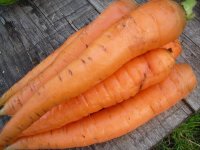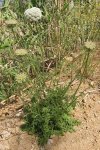Carrot sowing - daucus carota subsp. Sativus
Family Celery or Umbrella (Apiaceae or Umbelliferae).
Botanical characteristics. A biennial herbaceous plant originating from the Mediterranean. From ancient times to the present day, carrots are one of the most common and favorite vegetables.
In the first year, carrots form a rosette of leaves and a fleshy root of a reddish-orange color, yellow or white. In the second year - a rosette leaves, flower stems and seeds. Blooms in June - July.
Chemical composition. Root carrots contain beta carotene, carotenoids, nicotinic, pantothenic and folic acids, vitamins C, E, B1, B2 and B6, biotin, flavonoids, lecithin, phospholipids, inositol, sugars, pectin substances, fiber, minerals (potassium, magnesium, Phosphorus, chlorine, iodine, aluminum, boron, vanadium, iron, cobalt, copper, manganese, zinc). Seeds are rich in essential oils, flavonoids, coumarins, vitamin E. Carrot leaves contain carotene, ascorbic acid, and the whole complex of vitamins and minerals.
Application. Healing qualities of carrots were seen in ancient times. Hippocrates prescribed carrots for inflammatory diseases of the lungs, hemorrhoids, anemia, kidney stone disease, "chicken blindness", with insufficient lactation in women.
Carrots are rich in many antioxidant substances that stimulate immune responses. Thus, the medicinal properties of carrots are determined by the high content of carotene in it, whose role in metabolism is significant. Lack of carotene lowers the resistance of the body to stress factors, infections, radiation, leads to metabolic disorders, weight loss, growth retardation, disorders of the nervous system, many endocrine glands, loss of visual acuity. Carrots favorably affects the digestive organs, including the pancreas, improves liver function, has a positive effect on patients with chronic circulatory failure, with angina pectoris. Carrot juice is beneficial for patients with impaired renal function. Mixed with honey juice is traditionally used in folk medicine for inflammatory diseases of the respiratory tract. It heals well burns and other wounds, helps to stop the inflammatory process on the skin, relieves an allergic rash.
Carrots are rich in phytoncides, which makes it an active immunostimulant. And the phytoncid substances of carrots do not give an unpleasant smell, but the antimicrobial activity of carrots is very high. It is enough to chew a piece of carrot, as the number of microorganisms in the mouth decreases dramatically.
Carrots also have antihelminthic effect.
From seeds of carrots get active spasmolytic - daukarin, used for attacks of angina pectoris, colic.
Carrots - an indispensable dietary product in atherosclerosis, goiter, anemia, diabetes, peptic ulcer and duodenal ulcers, gastritis, colitis.
Preparation
- Carrot fresh juice : Roots are washed, peeled, grated, and then squeezed or squeezed juice in a juicer.
Juice with honey (a glass of juice and 1 tsp honey) is drunk with inflammatory diseases of the upper respiratory tract, asthma, pulmonary tuberculosis, with reduced visual acuity. - Decoction of tops of carrots : 1 tbsp. L. Dried and chopped tops of carrots pour a glass of boiling water and insist for 30 minutes.
They drink half a glass three times a day as a diuretic in cases of kidney disease, cardiac activity, radiation damage. - Decoction of carrot seeds: 1 tbsp. L. Dry ground seeds are poured with 1 glass of water and boiled for 1 minute, and then insist 2 hours in a warm place or in a thermos. Before use, filter.
Take on 2 - 5 tbsp. L. 3 times a day before meals with attacks of angina pectoris, with renal, hepatic, intestinal colic, headache.





Comments
When commenting on, remember that the content and tone of your message can hurt the feelings of real people, show respect and tolerance to your interlocutors even if you do not share their opinion, your behavior in the conditions of freedom of expression and anonymity provided by the Internet, changes Not only virtual, but also the real world. All comments are hidden from the index, spam is controlled.